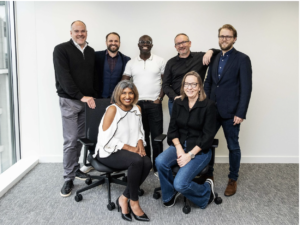The mood at Milken
As dealmakers descended on the Beverly Hilton hotel in Los Angeles this week for the annual Milken Institute Global Conference, they were laser-focused on one type of deal: trade deals.
The threat of an intensifying trade war cast a shadow over the event, Lauren Hirsch reports.
Many business giants in attendance — including Bill Ackman, Jensen Huang and Ken Griffin — started the year imagining how good things could be under President Trump. But talk at this week’s event, behind the scenes at least, was about how bad it could get. Speculation ranged from cautious optimism that the U.S. will quickly push through uncertainty to quiet fears of sustained pain.
Dealmakers view Treasury Secretary Scott Bessent as their last hope. Executives including Paul Taubman, the C.E.O. of PJT Partners, lined up early Monday morning to hear from Bessent, whom many executives view as their advocate in the tariff frenzy.
The consensus: The U.S. needs to alleviate the oppressive uncertainty lingering over the American economy by reaching a deal with at least one country quickly. Even if that “deal” is more of a news release than a fully negotiated pact. (More on that below.)
Many are planning for a rough year. Some say the country is already in a recession, and the question is just how steep it will get and how long it will last. Volatility has made it all but impossible to make big investments or do deals, with exceptions like the $9 billion takeover of Skechers proving the rule. As if dealmakers needed any reminder of the unpredictable business environment, many arrived in Los Angeles on Sunday evening as Trump threatened mind-boggling tariffs on the film industry.
A dearth of deals is likely to be particularly difficult for the private equity executives that traditionally descend upon Milken in hopes of raising more cash. Fund-raising is getting harder as a sustained deal-making slump has kept their investors waiting to see returns.
Any concerns didn’t stop them from kicking back, though: one rooftop cocktail party jauntily served “NAV-gronis,” which may be a reference to the loans some private equity firms have resorted to as a way to find liquidity.
Some attendees are still betting on deregulation and tax cuts. They happily noted that Bessent called out permitting overhauls in his Monday speech. (“The president doesn’t want to just ‘drill, baby, drill!’ He wants to ‘build, baby, build!’ he said.) They argued that discontent consumers and falling polling averages may counter Trump’s worst instincts.
And several present still expect tax policies to supersede any current angst. “Tax policy drives investment decisions,” Gary Cohn, who served as director of the National Economic Council in Trump’s first term, said onstage. “One of the most important things that has to happen this year is we have to, at a minimum, extend the Trump tax cuts.”
One potential tax hike consumed conversations. As large universities feel financial pressure from Trump’s funding freezes and threats to revoke their tax exempt status, rumors swirled at the conference that the next budget bill could significantly raise the tax rate on realized profits for certain endowments, which is currently 1.4 percent.
The increasing pressure on university finances could result in more universities following Yale’s lead by reducing their exposure to private equity. One hotly debated topic at the conference: Just how steep a discount would Yale or other universities take when selling off their private equity stakes.
DEALBOOK WANTS TO HEAR FROM YOU
We’d like to know how the tariffs are affecting your business. Have you changed suppliers? Negotiated lower prices? Paused investments or hiring? Made plans to move manufacturing to the U.S.? Or have the tariffs helped your business? Please let us know what you’re doing.
HERE’S WHAT’S HAPPENING
President Trump reportedly may pursue a major Medicare drug price overhaul. He could sign an executive order as soon as next week that would tie the prices the government pays for some medications to what other countries pay, though he hasn’t yet personally approved the plan according to Politico. Separately, Speaker Mike Johnson abandoned a potential big cut to Medicaid, bowing to pressure from politically vulnerable Republicans.
The Trump administration is weighing an overhaul of Biden-era chip export limits. The Commerce Department is planning to change a rule that imposes limits on how many artificial intelligence chips countries like India, Israel and Switzerland can buy, a spokeswoman told The Wall Street Journal. The move led to a jump in shares of chipmakers including Nvidia, which have argued that the Biden-imposed rules were denting American tech exports.
OpenAI hires Instacart’s C.E.O. to oversee its business and operations. The appointment of Fidji Simo, a former Facebook executive who has led Instacart for nearly four years, will oversee huge portions of the artificial intelligence giant, including sales and marketing. It’s meant to solidify the management team at OpenAI, with Sam Altman, who will remain C.E.O., free to focus on overseeing research, computing and safety systems.
The threat that Google investors really fear
Shareholders in Google mostly shrugged off two major antitrust defeats that the company suffered in federal court over the past year. They appear far more worried about the loss of a vital business deal.
Shares in the tech giant tumbled 7.5 percent on Wednesday after a top Apple executive said that the iPhone maker was considering replacing Google as the default search engine for its Safari web browser.
Apple is “actively looking at” adding A.I.-powered search engines as options for Safari, Eddy Cue, the company’s senior vice president of services, testified on Wednesday in the Justice Department’s antitrust lawsuit against Google’s search business.
Apple may eventually add search engines powered by artificial intelligence, including those from Anthropic, OpenAI and Perplexity, as options for Safari, Cue added.
It’s hard to overstate the potential impact. Being Safari’s default search provider means that Google served up billions of queries for iPhone, iPad and Mac users, giving it a huge leg up over search rivals. The arrangement is so powerful that Google pays billions of dollars a year for that right — and federal prosecutors have argued it should end.
Note that Cue testified on behalf of Google, and said he was worried about Apple losing that huge source of income.
Cue’s disclosure also underscores an existential worry for Google. While the company has praised its breakthroughs in artificial intelligence research, the financial engine behind the $1.84 trillion company remains search. The “search and other” division reported $50.7 billion in revenue last quarter, up nearly 10 percent year on year.
Cue noted that search queries on Safari dipped last month for the first time — already a worrying sign for Google — which he chalked up to users relying on artificial intelligence. Anything that poses a threat to the business that funds Google’s pivots to the future, including A.I., are something shareholders clearly take very seriously.
“Extreme flux”
President Trump’s trade war has put Jay Powell and his colleagues at the Fed in the same tricky place as much of the corporate world: in limbo. That was reinforced on Thursday when the president lashed out anew at the central bank chief.
But the uncertainty felt by Powell and corporate bosses could actually ramp up the pressure on the White House to deliver quick-win trade deals, or de-escalate its us-against-the-world tariffs fight. On Thursday morning, Trump teased that the “FIRST” one — with Britain — will be detailed on Thursday, with “many other deals” to follow.
The latest: Toyota and the shipping giant Maersk warned on Thursday that Trump’s levies were clobbering global trade and denting their bottom lines. “The current environment surrounding the auto industry, including trade relations, is in extreme flux,” Koji Sato, Toyota’s C.E.O., said at a news briefing.
Powell also has little visibility. That has essentially handcuffed the Fed on interest rates. The central bank has signaled that it’s in no rush to act, because lowering rates too soon could risk igniting inflation, just as companies warn that tariffs may scramble their supply chains and force them to raise prices.
On the flip side, staying on the sidelines too long could affect economic growth, threatening the labor market.
“It’s really not at all clear what it is we should do,” Powell said on Wednesday. That wait-and-see position is already irritating Trump. The president renewed his attack, writing on Truth Social that “‘Too Late’ Jerome Powell is a FOOL, who doesn’t have a clue.”
The divide between the markets and the Fed is also growing. Futures traders see another rate cut by July, but many economists aren’t so sure. “If our base case of a steady labor market and rising inflation is correct,” Aditya Bhave, a senior U.S. economist for Bank of America, wrote in a research note on Wednesday, “we don’t see a path to cuts in 2025.”
That uncertainty could take some shine off a big Trump announcement. With the president under pressure to show progress on trade deals, he promised that Thursday’s expected deal with Britain will be “full and comprehensive.” Trade specialists told The Times that they expect it to be more of a “framework” agreement than a finalized deal.
There are many questions about the nature of the accord. Will it cover digital services where the U.S. has a commanding trade surplus with Britain and most European countries? What about the billions of dollars’ worth of Hollywood films and TV productions that are produced in Britain, an outflow that Trump wants to stem via tariffs?
And more broadly, could this be a template for future deals?
What theme parks, and Abu Dhabi, signal about Disney’s succession
Disney reported earnings on Wednesday that handily beat estimates, with positive outlooks for its film and streaming businesses.
But the unveiling of a major theme park in Abu Dhabi underscores the importance of that operation to the media giant’s future — and may offer a clue about who could end up succeeding Bob Iger as C.E.O.
The entertainment giant, which owns ESPN, ABC, Disney+ and Hulu, more notably raised its profit outlook for the year at a time when most companies are revising their estimates for lower growth.
Disney said it expected higher earnings from its TV and streaming businesses, as well as its theme parks, the company’s most lucrative division. Shares jumped more than 10 percent, making Disney one of the S&P 500’s best performing stocks on Wednesday.
Then there’s the Abu Dhabi resort. The resort will be built and fully financed by an Abu Dhabi company, the Miral Group, with Disney overseeing the design and some of the management, according to Iger. Disney will not have any ownership and instead will collect a royalty.
Emphasizing the importance of the initiative, Iger greeted shareholders from Abu Dhabi for the company’s earnings call on Wednesday, announcing that the resort would connect “travelers from the Middle East and Africa, India, Asia, Europe and beyond.”
The resort could be insulated from President Trump’s trade war, including threatened tariffs on films produced overseas, since it’s ultimately a regional play, Brian Wieser, an analyst who runs the consulting firm Madison and Wall, told DealBook. (He added, however, that “travel tourism still faces big risks” and that “American brands face risks.”)
Then there’s the succession angle. Josh D’Amaro, the chair of Disney’s theme parks division, appeared with Iger in an interview on CNBC to discuss the Abu Dhabi theme park. Disneyologists are surely wondering whether the high-profile spot for D’Amaro, along with the strong performance of his division, suggests that he has an edge in the race to replace Iger.
His main internal rival is Dana Walden, the co-chair of Disney’s content business, though the board — led by James Gorman, the former Morgan Stanley C.E.O. — is also reviewing external candidates.
Disney said that it would announce Iger’s successor early next year.
THE SPEED READ
Deals
Politics, policy and regulation
Best of the rest
We’d like your feedback! Please email thoughts and suggestions to [email protected].










